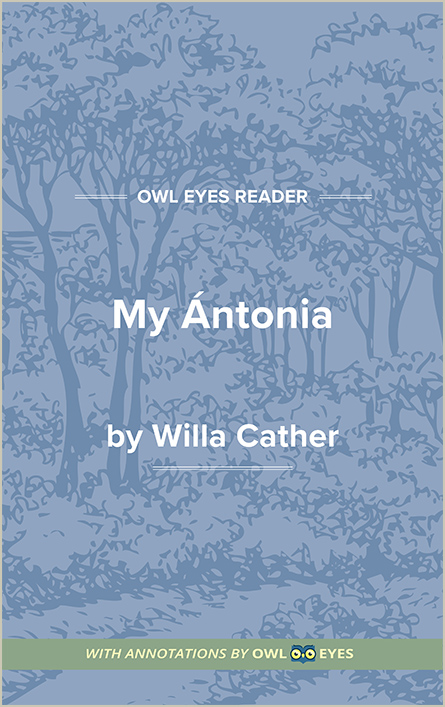Analysis Pages
Historical Context in My Ántonia
Homestead Acts and Frontier Life: The Homestead Act of 1862 was passed during the American Civil War (1861–1865) in an attempt to prevent the westward expansion of slavery. The Homestead Acts offered 160-acre parcels of land for a small filing fee if the settlers, called Homesteaders, agreed to work the land for a minimum of five years. This was an attractive option, especially for the working poor who sought an escape from the more rigid socioeconomic hierarchy of the coastal cities. It was also attractive for immigrants, like the Shimerdas, who hoped it would help them pursue the “American Dream” of becoming wealthy. However, most Homesteaders had no background in farming and had little money to buy the necessary tools to work the land. Resources were limited and socioeconomic hierarchies developed quickly, with immigrants‚many unable to read or speak fluent English—at the bottom.
Women in the 19th-Century American Frontier: During the 19th century, economic options for women were limited. If a family had the resources to send one of their children to school or to an apprenticeship in a town, it was typically the oldest son. Girls were expected to help with farm work, care for their younger siblings, and eventually get married. Financial independence was not something available to most girls, so marriage was the only option they would have to improve their situations. By the end of My Antonia, Cather subverts a lot of these narrative expectations surrounding gender through the stories of the Black Hawk working girls. Tiny Soderball, Lena Lingard, and Antonia all defy expectations and come to embody their own versions of success.
Historical Context Examples in My Ántonia:
Book I - Chapter I
🔒"Black Hawk, Nebraska...." See in text (Book I - Chapter I)
" Egyptian obelisk..." See in text (Book I - Chapter I)
"hieroglyphics..." See in text (Book I - Chapter I)
Book I - Chapter II
🔒"sod houses and dugouts..." See in text (Book I - Chapter II)
"Bohemian family..." See in text (Book I - Chapter II)
Book I - Chapter VIII
🔒"child with croup..." See in text (Book I - Chapter VIII)
Book I - Chapter IX
🔒"hartshorn bottle...." See in text (Book I - Chapter IX)
Book I - Chapter XII
🔒"Protestantizing..." See in text (Book I - Chapter XII)
Book I - Chapter XIII
🔒"deferred..." See in text (Book I - Chapter XIII)
Book I - Chapter XIV
🔒"“it will be a matter of years to pray his soul out of Purgatory, and right now he's in torment.”..." See in text (Book I - Chapter XIV)
Book I - Chapter XV
🔒"inquisitions..." See in text (Book I - Chapter XV)
"Sacrament to dying men,..." See in text (Book I - Chapter XV)
"cholera..." See in text (Book I - Chapter XV)
"We believe that Christ is our only intercessor.”..." See in text (Book I - Chapter XV)
Book I - Chapter XVIII
🔒"colic..." See in text (Book I - Chapter XVIII)
Book II - Chapter III
🔒"Negro minstrel troupes..." See in text (Book II - Chapter III)
Book II - Chapter IV
🔒"an age when she should still have been in pinafores...." See in text (Book II - Chapter IV)
Book II - Chapter VI
🔒"creche..." See in text (Book II - Chapter VI)
"Laplander's..." See in text (Book II - Chapter VI)
Book II - Chapter IX
🔒" go into service. ..." See in text (Book II - Chapter IX)
Book II - Chapter XII
🔒"schottische..." See in text (Book II - Chapter XII)
Book II - Chapter XIV
🔒"Virgil..." See in text (Book II - Chapter XIV)
Book II - Chapter XV
🔒"poulticing me, and rubbing me with arnica...." See in text (Book II - Chapter XV)
Book III - Chapter I
🔒"Tragic Theater at Pompeii,..." See in text (Book III - Chapter I)

